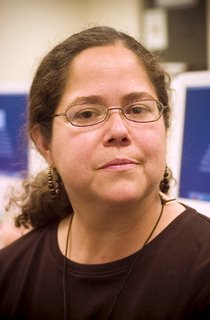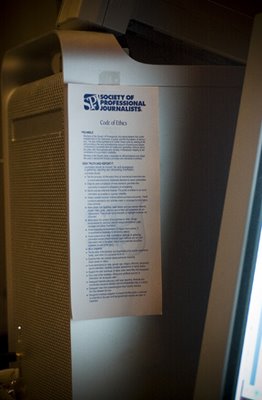What? Where did ‘What's wrong with this picture?’ go?
Nowhere. You may notice a format change though. We just have some other material that will be creeping in. That is an “editorial ‘We’” that means “I.” However, in the journalistic world a publication is plural.
Oh No! “Real journalism!” What is my blogging world coming to? All right, I’ll take my tongue out of my cheek.
 I am taking a journalism course, intermediate reporting, at the University of New Mexico with Assistant Professor Ilia Rodríguez. The class is a practicum, requiring a fair amount of writing, up to four stories a week.
I am taking a journalism course, intermediate reporting, at the University of New Mexico with Assistant Professor Ilia Rodríguez. The class is a practicum, requiring a fair amount of writing, up to four stories a week. Each student selected a beat, a particular narrow range of issues for them to cover and about which to write, as if working for a newspaper. Most of the 16 students have chosen to cover on-campus events including: UNM Central administration, athletics, animal research, campus police, minority affairs and women issues.
No surprise, my beat, is city and state politics. Having a blog helped convince the professor that I was already tracking a legitimate beat; no need to double the work.
There is a difference in writing styles. For ‘What's wrong with this picture?’ I mix reporting news events with history, analysis and my thoughts, and I editorialize. Some journalistic purists don’t think this constitutes being a “journalist.”
I am not so pure. I believe that we cannot live outside of our own skin, that no matter how hard we try to be fair and objective, we still have biases and feelings that we do not overcome. Sometimes in trying to suppress these human feelings we find that we go further than mid point. I believe that bylines are there for more than just egotistical reasons. They exist so readers can come to get to know the writers, to compare their reporting with that of other reporters, to understand them and their independent viewpoints.
Why fight it? I believe it is in the best tradition of the great pamphleteer Tom Paine whose essay “Common Sense” sparked the American Revolution. Then his on-going “The Crisis,” published during the Revolutionary War, had a per capita readership larger than the percentage of people who watch today’s Super Bowl. I don’t have that kind of eloquence, influence or readership. I could only wish. So, I just share my thoughts of how I see the world. I won’t try to tell you what to think, only how I see it.
It is my hope that you, my regular readers, know that the stories I tell come from my unique perspective, that I try to be fair and objective, but don’t always feel the need to seek out what you and I know will be a spun version of a defensive posture.
Further, I realize that I am not the only voice in the information business. Journalism purists take the position that you need go no further than their publication for your news – they have all the news “that’s fit to print” and that's all the news you need.
James Madison, the “Father of the Constitution,” and one of the authors of the Federalist papers and who helped write and pass the Bill of Rights, espoused the theory that public opinion was crucial and that information had to be brought into the public square, “the marketplace of ideas.” Contrary to the journalistic purists, their idea of “just the facts” is not the only thing that constitutes journalism.
Truth in advertising goes a long way. When I read, I want to know who is writing to me. I want to know their backgrounds and experiences, what life crisis have affected them. I expect them to have a slant, if they don’t, they add little or nothing to the discussion.
I am going to post my class projects. They will have more of that journalistic purist style than my ‘What's wrong with this picture?’ writing does. There will still be my take interspersed with J schooling.
I recently had a discussion with what I will call a “journalistic purist,” who was very dismissive of bloggers, as only exercising “free speech.” My take, journalists are those who keep journals, whether opinionated or not.
 I have the Society of Professional Journalists code of ethics taped to the side of my computer to remind me of the obligations. Yet I don’t always constrain myself to them. I do, however, follow the National Press Photographers creed. You won’t find manipulated photographs. I will juxtapose photographs to make a point but I will not create a single image from multiple images. If I ever do I’ll clearly let you know.
I have the Society of Professional Journalists code of ethics taped to the side of my computer to remind me of the obligations. Yet I don’t always constrain myself to them. I do, however, follow the National Press Photographers creed. You won’t find manipulated photographs. I will juxtapose photographs to make a point but I will not create a single image from multiple images. If I ever do I’ll clearly let you know. If the late and former speaker of the U.S. House of Representatives Tip O'Neill was right when he said, “All politics is local,” then my thought that, “all reporting is personal,” might be equally valid.
Journalism is a craft, not a profession, though those who practice the craft may act in a professional manner. The attempt of purists to hijack the term journalist by redefining those who have not graduated Journalism school have taken themselves way too seriously.
No comments:
Post a Comment